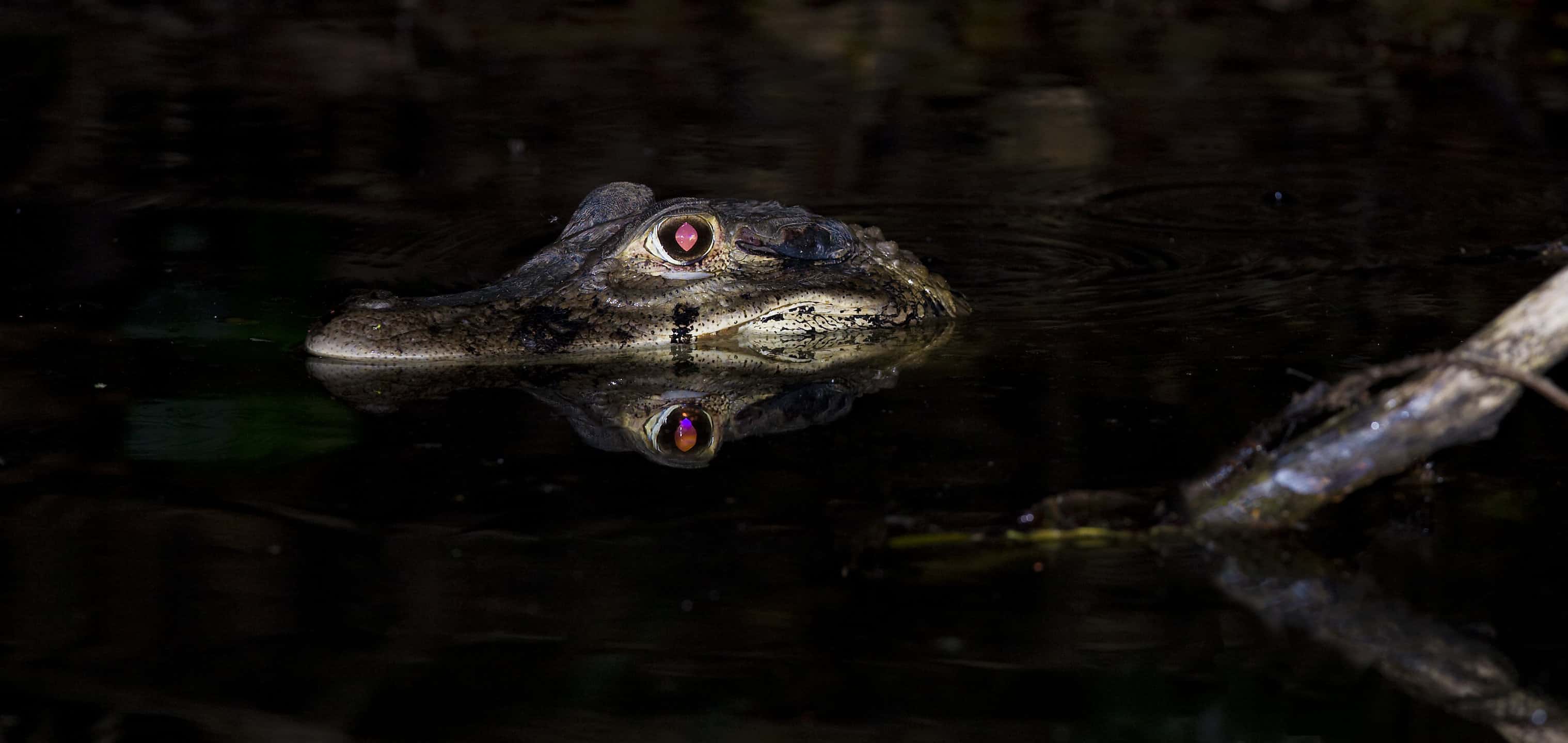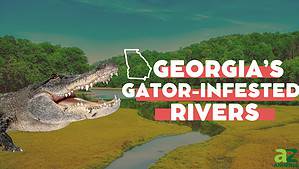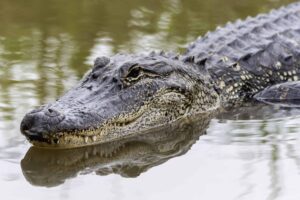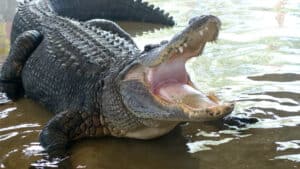Although Georgia has alligators, you only find them in the southern part of the state. From Columbus through Macon to Augusta is what is called the “fall line.” North of this line is too cold for alligators to reproduce. But, even though alligators can only be found in parts of the state, there are still between 200,000-250,000 alligators. That might have southern residents concerned about the alligators in Georgia: is it safe to swim?
Alligator Hunting Habits
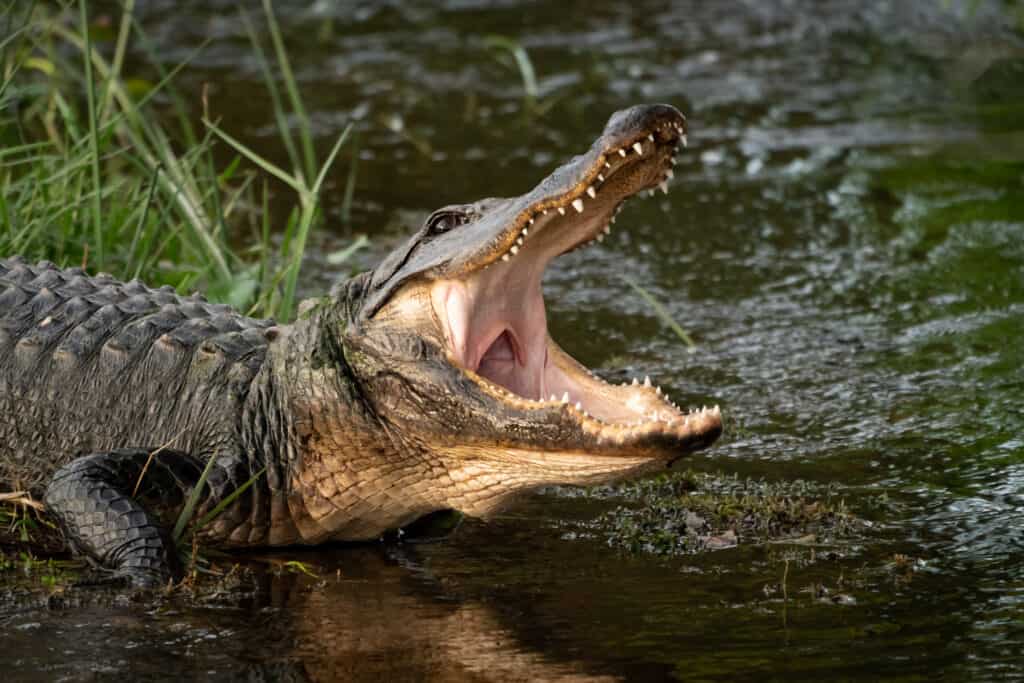
You’ll often see alligators basking on sunny days to warm up.
©Deborah Ferrin/Shutterstock.com
In the wild, many alligators live between 35-50 years. While alligators have the potential to grow 10-15 feet in length, the biggest alligator found in Georgia was 14 feet and 1 inch long. And it was 700 pounds, though many alligators can weigh as much as 1,000 pounds. Though they are fearsome in size, an alligator’s short legs limit its hunting capabilities. Alligators are unable to pursue prey at any length and rely on the ambush technique to catch prey.
Because of their knobbly backs and dark coloring, alligators blend in seamlessly in wetlands or swamps. Using the murky water to their advantage, many creatures might mistake a floating alligator for harmless driftwood. But, as an alligator creeps up on its prey, it uses its formidable jaw strength to grab prey. An adult alligator chomp force can be as much as 2,000 PSI!
Alligators like prey they can devour quickly, such as fish, frogs, birds, and the like. Because they are cold-blooded, they only need to eat once or twice weekly. But, they can go up to two years without eating, living on fat reserves.
As ectothermic reptiles, alligators depend on the outside environment to regulate their internal temperatures. You’ll often see alligators basking on sunny days to warm up. Or, on especially sweltering days, they will use deep water to keep from overheating. Hot days are usually when swimmers want to take advantage of the water. So some may be wondering, when it comes to alligators in Georgia: is it safe to swim?
Alligator Hotspot in Georgia
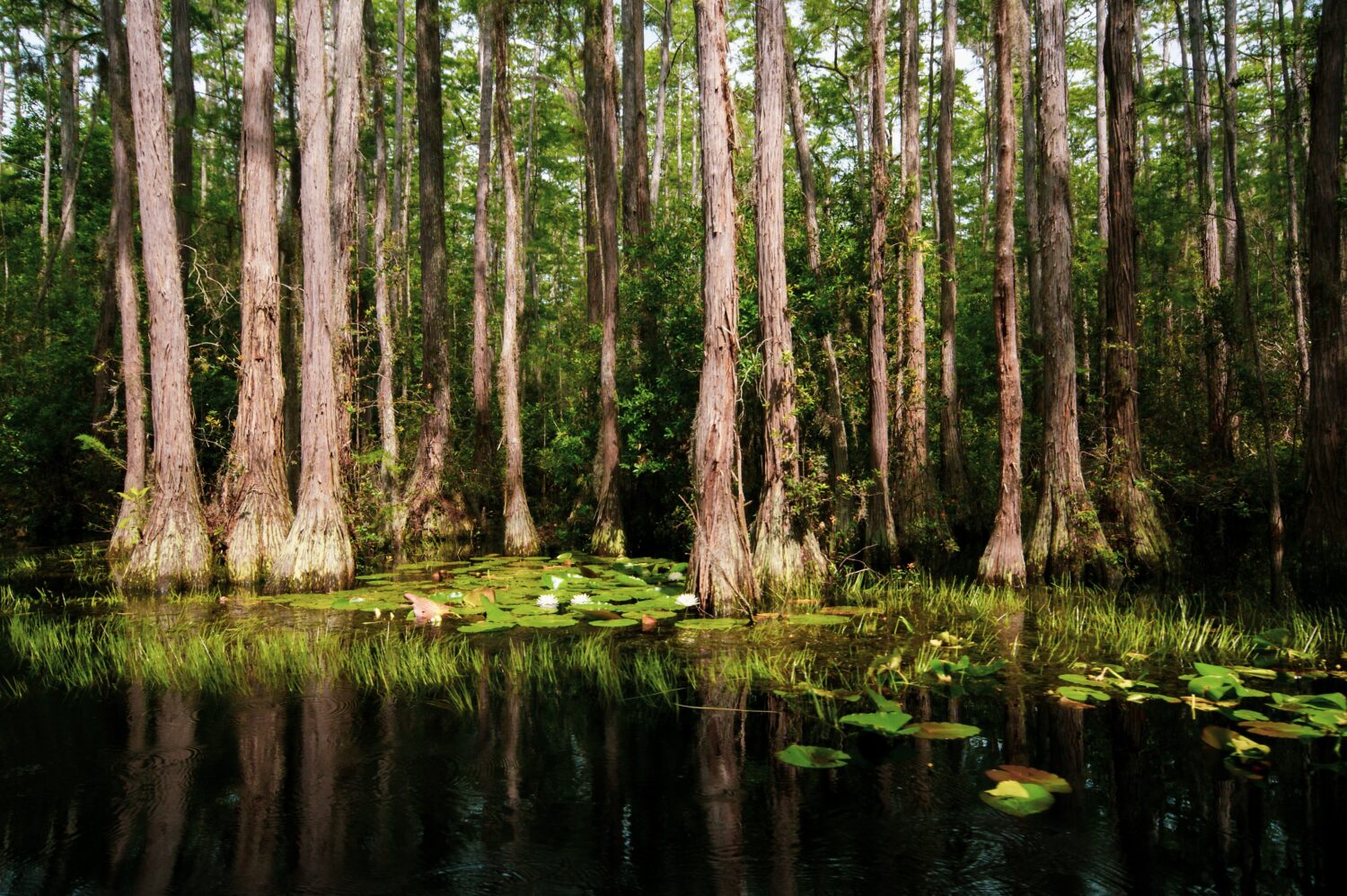
Okefenokee Swamp is
North America’s
largest blackwater wetland ecosystem, covering 438,000 acres.
©anjahennern/Shutterstock.com
The Okefenokee Swamp in southern Georgia is home to about 13,000 of the state’s total alligator count. Okefenokee Swamp is North America’s largest blackwater wetland ecosystem, covering 438,000 acres. As the slow-moving water moves through the forested swamps, decaying vegetation gives the water the appearance of black tea. This is a prime environment for the alligator, not to mention the swamp is protected as a wildlife refuge.
Besides this swamp, anywhere below the “fall line” in the state’s southern half is where alligators like to be. Alligators like it when temperatures are between 80°F to 90°F, and this is when they do their basking, hunting, and relocating to different water sources.
But, when you are looking at 70°F or lower, alligators slow down. No longer hunting or eating, alligators reduce activity to conserve energy. But, when facing 55°F or colder, that is when alligators become inactive. They will hide in burrows dug into the mud and remain dormant until warmer weather.
Alligators in Georgia: Is It Safe to Swim?
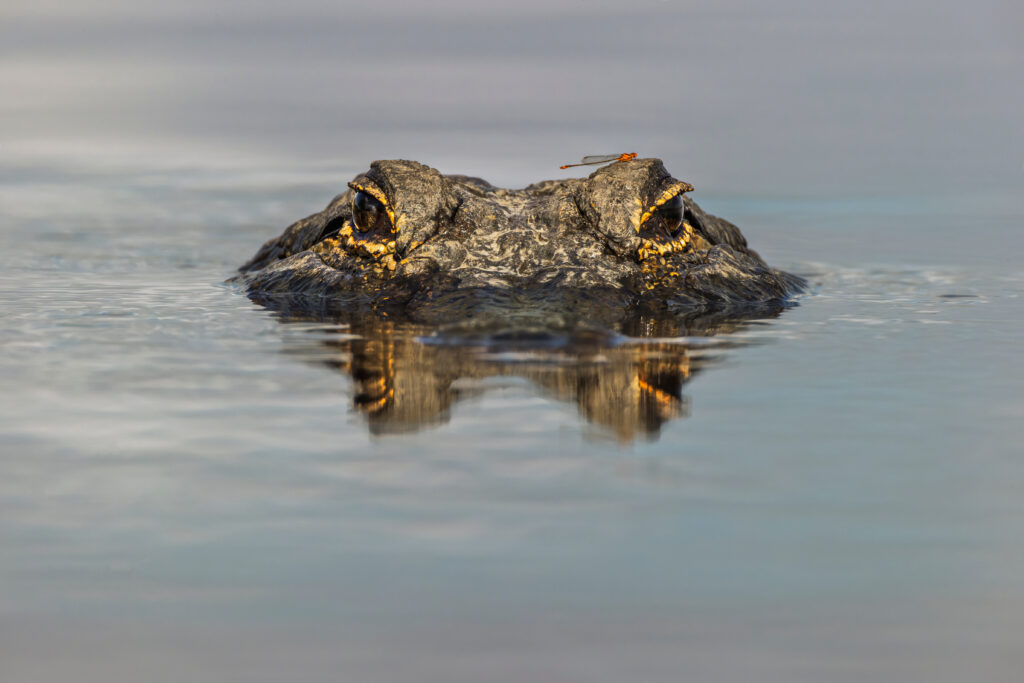
But, if you want to swim surrounded by nature, like at Little Ocmulgee Lake or Daughtry Lake South, there are a few safety tips to remember.
©Danita Delimont/Shutterstock.com
If you want complete safety, an indoor or outdoor pool is your best bet this summer. Most pools have fences to keep wildlife out, and the water is completely clear, so you can see if one accidentally sneaked in! Also, most lakes and swimming spots north of the “fall line” will be pretty secure from alligators since it’s too cold for them. But, if you would like to swim surrounded by nature, like at Little Ocmulgee Lake or Daughtry Lake South, there are a few safety tips to keep in mind:
- Don’t go swimming as the sun goes down or when it is nighttime. Alligators do the majority of their hunting when it gets dark. Plus, you’ll have trouble seeing one coming!
- Don’t swim anywhere with many trees or foliage around the shoreline. Alligators hide in places such as these to ambush prey. And again, you’ll have more trouble spotting one disguised in the underbrush.
- Always bring a friend with you or swim at a familiar swimming spot. Having a crowd of loud swimmers will help scare away the alligators.
For more ideas of great swimming spots in Georgia, check out our guide.
Eluding Alligator Encounters
Despite how intimidating they look, alligators actually fear humans. Usually, an alligator will go the other way if humans are nearby. In fact, between 1960-2007, there have only been nine recorded alligator attacks on humans in the state, according to the Georgia Department of Natural Resources.
However, if people are feeding alligators, this changes the dynamic. Alligators start associating people with free food. And, if there’s no hand-out, the alligator might get feisty. In fact, willfully feeding or baiting wild alligators is illegal in the state of Georgia. Any offenders will be charged with a misdemeanor with a fine of $200 or jail time for up to 30 days.
In general, it’s good practice to give it space if you see an alligator. Avoid densely covered shorelines and stay in well-lit areas at night. On the whole, if an alligator hears you, it will also give you space!
If You Are Attacked…
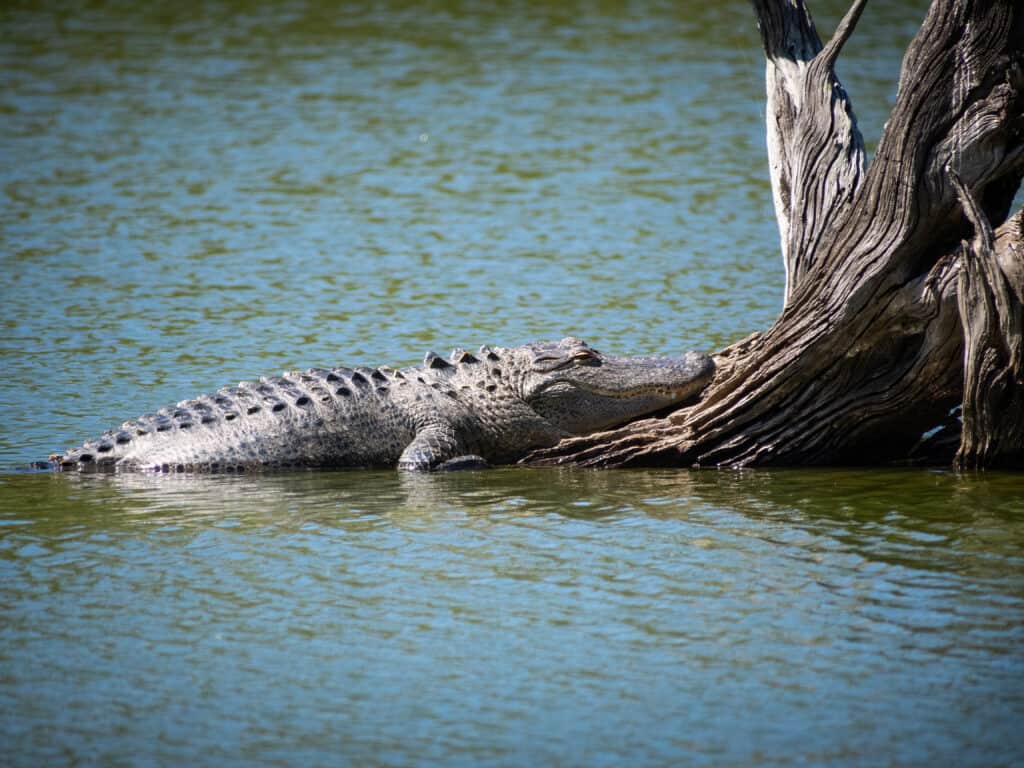
Alligators are very practical hunters, and if they think it’s going to be a big struggle, they’ll probably decide it’s not worth it.
©Eugenie Robitaille/Shutterstock.com
In the very rare circumstance that an alligator grabs you, make sure you put up a huge fight. Alligators are very practical hunters, and if they think it’s going to be a big struggle, they’ll probably decide it’s not worth it.
Don’t focus on opening the alligator’s jaw—it’s extremely strong. Instead, pop them in the sensitive areas. The tip of the snout is very tender on an alligator, and some forceful punches might be enough to get the alligator to let go. Or, poke it in the eyes, which may trigger a release.
Another option is to use objects around you to trigger the gag reflex of the alligator who has grabbed you. Taking branches, rocks, or your shoe, shove it violently to the back of the alligator’s mouth. When you stimulate the back of the tongue or tonsil area, the alligator will gag, giving you a chance to escape.
At all costs, do not let them roll you in the water. Alligators are very powerful, and they use this death roll to disorient their prey. At the same time, this death roll also serves to drown bigger victims. If you feel the alligator turn, don’t resist it. In fact, roll with the alligator as best as you can. Then, continue to attack its snout or gouge its eyes.
Once released, you should get to land, where alligators are at a disadvantage. While an alligator can swim up to 20 mph on land, its max speed is only 10 mph. Also, get seen by a doctor as quickly as you can. Even if the bite doesn’t seem bad, an alligator’s mouth is packed with bacteria that will lead to infection.
Swimming Safely with Georgia Alligators
You can enjoy swimming outdoors in a Georgia summer by practicing smart swimming and keeping to popular lakes or rivers. Plus, some of the most frequented spots are north of the fall line, with hardly any alligator activity. All in all, when considering alligators in Georgia and if it’s safe to swim, alligators avoid swimming with you too.
Thank you for reading! Have some feedback for us? Contact the AZ Animals editorial team.

